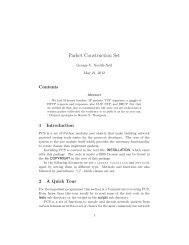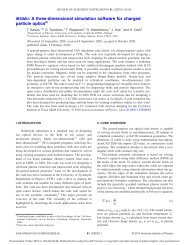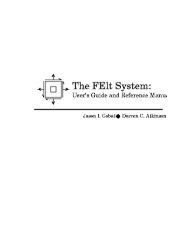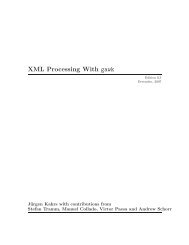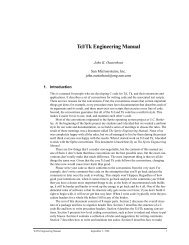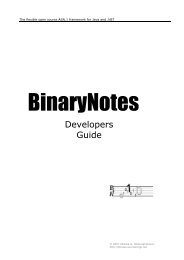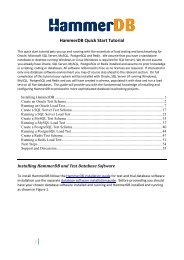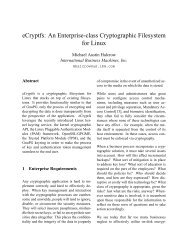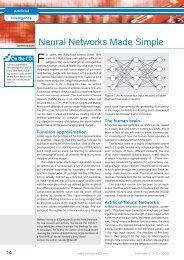libSRTP 1.4.3 Overview and Reference Manual - SourceForge
libSRTP 1.4.3 Overview and Reference Manual - SourceForge
libSRTP 1.4.3 Overview and Reference Manual - SourceForge
You also want an ePaper? Increase the reach of your titles
YUMPU automatically turns print PDFs into web optimized ePapers that Google loves.
<strong>libSRTP</strong><br />
5.3.1 Detailed Description<br />
5.3 SRTP events <strong>and</strong> callbacks<br />
<strong>libSRTP</strong> allows a user to provide a callback function to h<strong>and</strong>le events that need to be dealt with outside of the data plane<br />
(see the enum srtp_event_t for a description of these events). Dealing with these events is not a strict necessity; they<br />
are not security-critical, but the application may suffer if they are not h<strong>and</strong>led. The function srtp_set_event_h<strong>and</strong>ler()<br />
is used to provide the callback function.<br />
A default event h<strong>and</strong>ler that merely reports on the events as they happen is included. It is also possible to set the event<br />
h<strong>and</strong>ler function to NULL, in which case all events will just be silently ignored.<br />
5.3.2 Typedef Documentation<br />
5.3.2.1 typedef struct srtp_event_data_t srtp_event_data_t<br />
The struct srtp_event_data_t holds the data passed to the event h<strong>and</strong>ler function.<br />
5.3.2.2 typedef void( srtp_event_h<strong>and</strong>ler_func_t)(srtp_event_data_t ∗data)<br />
The typedef srtp_event_h<strong>and</strong>ler_func_t is the prototype for the event h<strong>and</strong>ler function. It has as its only argument an<br />
srtp_event_data_t which describes the event that needs to be h<strong>and</strong>led. There can only be a single, global h<strong>and</strong>ler for<br />
all events in <strong>libSRTP</strong>.<br />
5.3.3 Enumeration Type Documentation<br />
5.3.3.1 enum srtp_event_t<br />
The enum srtp_event_t defines events that need to be h<strong>and</strong>led outside the ‘data plane’, such as SSRC collisions <strong>and</strong><br />
key expirations.<br />
When a key expires or the maximum number of packets has been reached, an SRTP stream will enter an ‘expired’<br />
state in which no more packets can be protected or unprotected. When this happens, it is likely that you will want to<br />
either deallocate the stream (using srtp_stream_dealloc()), <strong>and</strong> possibly allocate a new one.<br />
When an SRTP stream expires, the other streams in the same session are unaffected, unless key sharing is used by that<br />
stream. In the latter case, all of the streams in the session will expire.<br />
31



